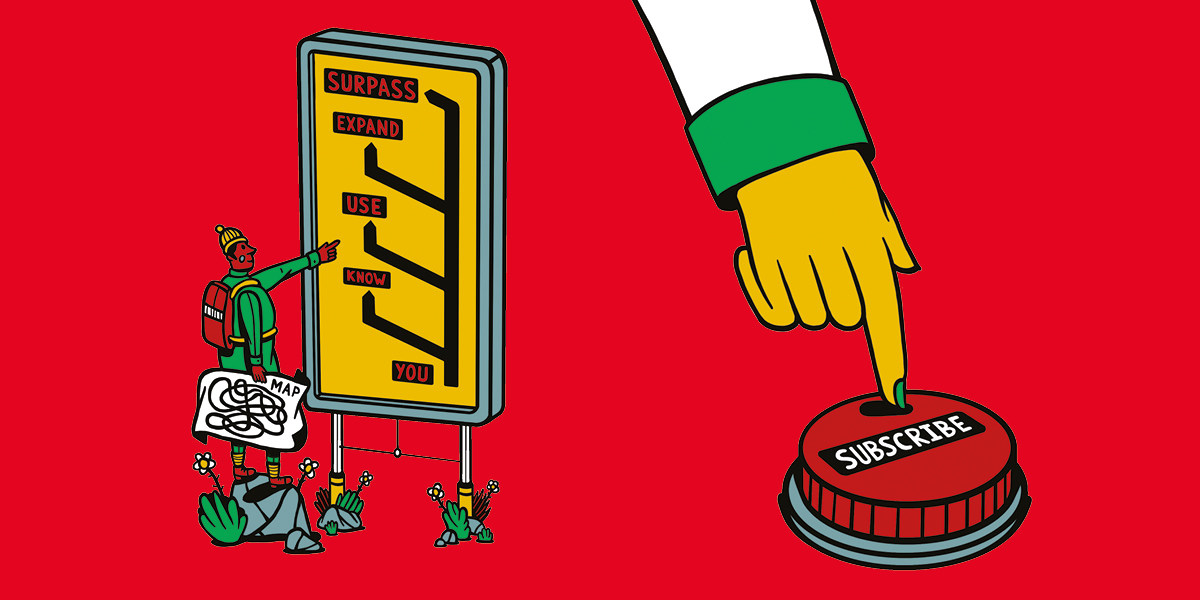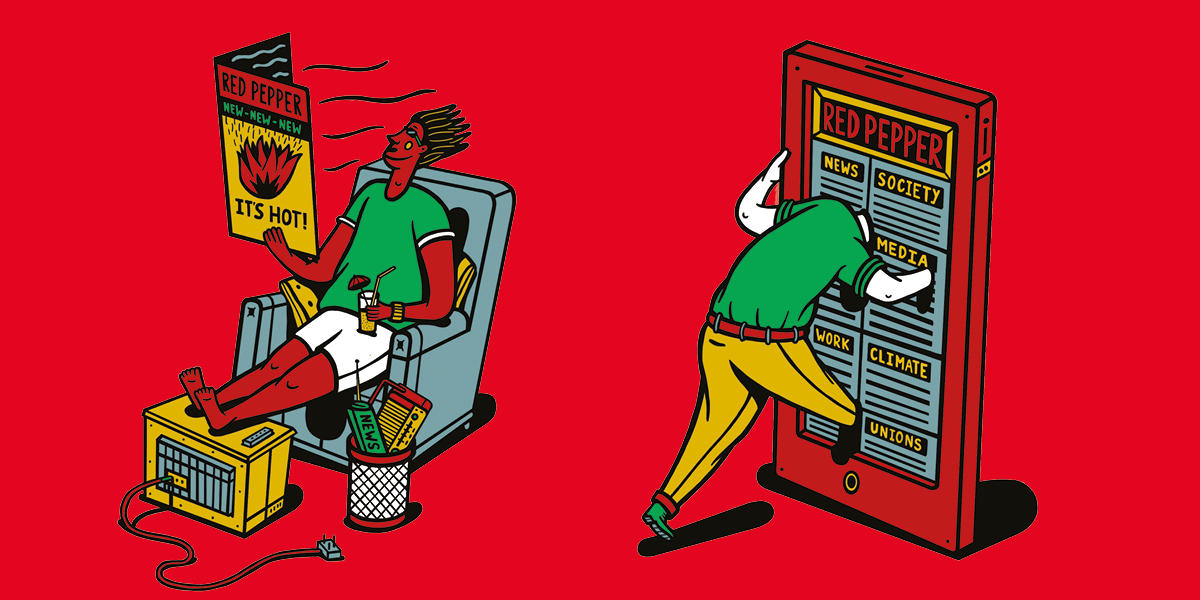In March 2025, after 31 years of print production, Red Pepper magazine released its 247th quarterly print edition. Provocatively titled ‘The Last Issue?’, it explained the financial realities that have prompted us to explore new models for a sustainable future. True to our socialist and democratic values, we asked our readers and supporters to help shape what comes next.
Over 300 people took part in our Community Consultation through our survey, focus groups and events held in Leeds, London, Manchester and online. More contacted us directly, via emails and social media. We met with movement partners, allies, suppliers and media experts to explore potential new formats and avenues for our work. We heard from recent and long-time subscribers, casual readers and even people who’d never heard of us before – all eager to help transform the media landscape.
The Consultation delivered rich insights into why Red Pepper matters, what more readers want from us and how they engage with left media more broadly. The process also created space for people to register frustration and declining trust in legacy news outlets, voice fears about right-wing capture of online platforms and share new ideas for building solidarity and knowledge across social movements.
Overall, loud and clear, we heard: people are sick of the status quo. They want independent media they can trust – a media that invests in and reliably delivers facts, debate and varied left-wing analyses. The revitalised and relaunched Red Pepper Media will deliver on all counts.
Red Pepper Media: Ready to launch
The new model for Red Pepper Media (RPM) stays true to our print roots while expanding our digital reach and prioritising quality over quantity – careful curation over clickbait and churn found elsewhere. It platforms accessible, high-quality writing from a range of perspectives while retaining a fiercely independent, non-partisan editorial line.
More strongly and overtly than before, RPM will also support movement-building through partnerships, training and political education – as our loyal readers have told us they want to see. From Summer 2025, RPM will…
- Publish new weekly online articles – all rigorously factchecked, non-partisan and written by emerging and leading voices of the international left.
- Deliver an expanded fortnightly e-newsletter direct to subscribers’ inboxes – with new writing, movement updates, recommendations, events, opportunities, offers and more.
- Publish an annual print edition – an extended, journal-style issue that retains our high production values, engaging illustration and all your favourite content – plus even more substantial analysis and debate.
- Host an annual event – launching our print edition with a forum for community-led debate.
- Embed our FULL digital archive on our website – offering seamless access to our 30-year(!) back catalogue, an invaluable resource for readers, campaigners and researchers.
- Publish collaborative reports, investigations and resources – working with partners to promote media democracy and strengthen the left media landscape. Deliver new trainings and mentorship programmes to grassroots groups and individuals underrepresented in journalism – supporting the skills development needed to reshape the media
‘Red Pepper aligns with my political and ethical beliefs. I want to be informed and learn about how the fight for social justice plays out across the world in which we live and in spaces I am both familiar and unfamiliar with. It is vital that we have organised voices on the left challenging the narrative [of] an insurgent populist right’
– survey response
If it ain’t broke…
Our Consultation survey respondents told us that – by far – the most important role Red Pepper serves is providing a non-sectarian platform for critical debate. They emphasised its high-quality journalism and commitment to platforming grassroots voices and diverse perspectives as key to its appeal. We’re regarded as a trustworthy alternative to mainstream media that offers stories and analysis ‘not found elsewhere’. Because of this, Red Pepper has been an ‘entry point’ to left movements for many readers – particularly via coverage of underreported international issues and its use of accessible, ‘non-jargony’ writing within an engaging, vibrant design.
Overall, it offers readers a ‘sense of community’ while resonating with their core socialist values. The overwhelming majority of respondents want us to retain these core principles and purpose. They do not want us to pivot to ‘breaking news’ or branch out rapidly to podcast and video platforms. They told us clearly: ‘Don’t try to do too much!’ and to ‘prioritise quality, not quantity’.
‘Reading Red Pepper reminds me there are like-minded people out there – and indeed that another, beautiful world is possible’
– survey response
Pressing issues
Publishing informed articles on a wide variety of topics has been central to Red Pepper’s appeal – and our mission to energise and educate the left from a non-dogmatic base. Some areas remain high priorities for readers, however.
Top of the vox pops are…
- Debates on left strategy
- Climate and the
- Environment
- International analysis
- Local UK politics and campaigns
- Work and unions
- Books, arts, culture
- Police, protest and civil liberties
- Economics
‘The journalism is so engaging and actually tells the story of the subject. I feel as though there is no agenda to capture me. Red Pepper’s focus on local organising and politics with an international lens sets it apart from other left publications’
– survey response
How we win
A topic emphasised within focus group discussions on left media more broadly was ‘how we won’ stories – an important reminder that we must celebrate and explain how successful alternatives and movements for change are already being built, while still analysing what more can be done.
Readers not yet supporting Red Pepper told us to pay more attention to feminism and racial injustice, while all groups called for deeper coverage of far-right movements. These related topics are rapidly dominating our surroundings – and resonate with the reader’s insight that: ‘journalism that effectively challenges rightwing narratives must feel relevant to peoples’ everyday lives’.
While some told us our theory-focused content can feel ‘dumbed down’, others found it ‘too dense’. Editors have taken all this feedback on board – and are focusing on striking a balance through careful commissioning and by using explainers, jargon-busters and ‘fact files’ to ensure articles feel relevant and accessible without simplifying complex histories or ideas.
‘[Red Pepper has] provided me with some of the sharpest and most insightful, non-sectarian leftist commentary and analysis both before and after I lived in the UK. The result is an analysis I expect to be able to trust, even when I disagree – such is the character of an inclusive left’
– survey response
Formats for the future
Unsurprisingly, Red Pepper subscribers really like the physicality of print – and want us to continue producing it. While some suggested that we reduce the quality of materials to cut costs, far more cited ‘high production values’ as essential to the magazine’s appeal. We simply cannot cut the labour cost of producing accurate, reliable, thoughtfully curated journalism – and will not promote unethical advertisers or sacrifice our editorial independence for a wealthy backer or buyer.So: we’ve decided to compromise – while leaving the door open to print regrowth.
From 2026, we will publish an extended annual print edition, delivered directly to subscribers every Spring. We will also pursue partnerships that allow us to publish one-off mini-editions on a focused subject, in the mould of our popular Mythbuster series. We cannot publish more often without a substantial boost in income. See page 13 for how we plan to build that revenue sustainably. While many Consultation respondents praised print, far more said the highest priority was publishing ‘at least one online article per week’ – and ensuring that content remained freely accessible. We have ramped up online commissions and are already meeting this goal.
We face a clear challenge, however: our online articles are highly regarded, but underexposed. We know that the social media barons and economic forces dictating algorithms are not on our side. Would-be readers are turning away from Twitter/X and Facebook but not yet migrating elsewhere en masse. This dynamic is harming independent media more broadly and risks squeezing us off screens. Yet we also know that ‘follows’ and ‘likes’ are not the same as deep engagement – and that it is dangerous to chase metrics over genuine political education and movement building.
There is cause for optimism, however. Hard data reveals our readers deeply engage with our digital email newsletters, leading to more and lengthier reads than ‘organic’ website visits. The Consultation also revealed people’s growing enthusiasm for sharing articles with friends and allies via private, not public, forums – especially community and campaign-related email, WhatsApp or Signal groups. We need to harness these lines of communication.
Going forwards, RPM will publish a substantially improved and carefully curated fortnightly direct-to-inbox subscribers’ newsletter. We’re also moving our brilliant archive onto our own website, for seamless access. We’ll encourage and make it easier for readers to share our journalism and help build our reach through community networks. Enthusiastic ‘Share’ button clicks will be vital to our growth.
Finally, despite some eager calls for it, Red Pepper Media will not be branching into podcasts and videos – at least not yet. Producing the reliable, fact-checked, well-edited coverage our readers expect of us, with diverse, international contributors, requires substantial investment in any format. We will continue to collaborate with established, like-minded platforms however – building on our brilliant 2024 series ‘Beyond The Strikes’ co-produced with Surviving Society.

Strength in Collaboration
While one in three survey respondents said ‘supporting movement building and networking’ was an important current function of Red Pepper, a huge 80 per cent told us it should become our highest priority. The suggestion to ‘run campaigns / lobby for social change’ was only a little less popular, and many also called on us to ‘hold events and debates, online or in-person’. Three quarters ranked ‘funding investigative journalism’ as a ‘very high priority’ – while two thirds asked us to do more to ‘mentor new writers’.
Without overstretching our team, we’ll pursue all of these activities through strategic partnerships. We are renewing our focus on collaboration with other left media, education and campaigning organisations, both UK-wide and internationally. Working with experienced allies and sharing our own skills and platforms will also help us reach new audiences for RPM. Our door is always open to new ideas – and we look forward to hearing more of them from you, our readers and movement-building partners!
The state of the media
The Consultation revealed stark levels of disengagement, distrust and even disgust with legacy and popular media. Positivity towards the BBC – already eroded by its coverage of Corbyn, cosiness with Conservative leaders and excessive platforming of Reform MPs – has been wiped out by cowardly editorial lines on Gaza. The Guardian was slammed for largely embracing Starmerism.
Frustration abounded over paywalls, article limits, ads and ‘Accept Cookies or Pay’ pop-ups creeping in everywhere online – and only reinforcing media ‘bubbles’. We heard real fears about AI-produced ‘content’ and disinformation masquerading as news, and around new rightwing media barons like Paul Marshall (owner of Unherd, GB News and The Spectator).
Left media also prompted lively debate. Patreon feeds and direct-to-camera polemics by ‘big names’ were regarded as increasingly popular (and populated) arenas for influence – though some doubted the lasting political impact of ‘London-centric’ and ‘personality-led’ video platforms, especially when reliant on corporate host YouTube.
Independent local media was also widely cited as a cause for optimism. STAT – an ‘anti-profit arts and culture magazine covering the North West – is receiving plaudits. While not left-wing, Mill Media is notable for its direct-to- inbox model and attention to pressing local issues in Manchester, with smaller but growing sites in Birmingham, Glasgow, Liverpool, London and Sheffield. The Byline Network uses a similar model, supported by (but independent from) The Byline Times, while the Public Interest News Foundation’s Indie News Week 2025 is helping promote and connect small outlets nationwide.
These projects emerge from the widespread thirst for more relevant, informed and varied news and analyses. In our ‘post-truth’ world, there remain sources of inspiration across varied formats for building a better media landscape.
The revolution will be reader-funded!
RPM will continue to be primarily reader-funded – and first and foremost accountable to its paying supporters. While co-operatisation is not viable at our current size, we are exploring alternative organisational models that better reflect our horizontal structure and non-profit ethos – and that open up new sources of funding.
Readers have told us to retain our ethical advertising policy, to offer competitive and fair rates to contributors and – very emphatically – to keep our slidingscale subscription model. Reflecting our shared socialist ideals, paying subscribers have little interest in ‘perks’ or ‘rewards’. They want everything for everybody, regardless of ability to pay. This is heartening to hear – but demands action. The solidarity economy requires solidarity investment!
Our incredibly loyal readership has continued to support us even when money is tight. Rising living costs and stagnating pay are biting hard for many. Lack of income remains the number one reason given by those who cancel subscriptions. At the same time, a significant number of readers told us that they are ready and willing to pay more. Many supporters have stayed locked into an unchanging minimum payment for years – or decades – mainly because we’ve not asked or advertised how they can bump up their rate with inflation.
Consequently, a huge two thirds of subscribers pitch in just £2 or £3 per month – far below comparative outlets’ basic rate. Presenting a powerful alternative to the millionaire-backed mainstream media should not – and does not – cost less than a monthly cup of coffee. The secret to sustaining RPM is simple: supporters who can pay must pay what they can.

A transparent business plan
Going forwards, RPM will offer three tiers of regular monthly contribution:
Lower income: £4
Sustaining: £6
Movement-building: £10+
Additional funding for RPM will come from:
- Organisational Allies – we invite unions, branches, grassroots supporters, campaigning organisations and other groups to generously fund knowledge sharing and solidarity across movements! From as little as £100 per year, we’ll provide them with annual print issues to distribute, members’ access to our full archive, a logo on our website and opportunities for media strategy and skills training
- Donations – we know that some people prefer to support us with one-off donations rather than through a monthly commitment – and we’re grateful, either way!
- Legacy gifts – a way to continue strengthening the left, long after death
- Direct Sales – independent bookshops have been among our biggest supporters and we’ll continue filling their shelves
- Advertising – a small amount of income will come from ethical advertisers
- Grants and partnerships – support from radical and socialist foundations will remain vital for running specific political education projects, trainings and events
The best way to support Red Pepper Media is to spread the word – share our articles with your friends and comrades, and tell them to join the revolution!
REPORT CREDITS:
- RESEARCH AND TEXT Siobhán McGuirk
- ILLUSTRATION Phil Wigglesworth
- DESIGN Tom Lynton










